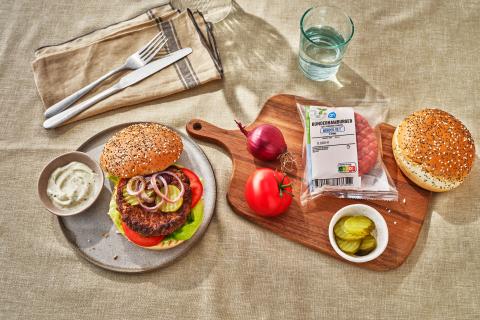
Hybrid meat, also called blended meat, is traditional beef combined with plant-based proteins. These products seem to be gaining in popularity, although they are not new. The first such products appeared in the supermarket more than five years ago, as several chains launched new ranges. But the products were pulled shortly after launch.
Today’s consumer, however, may be more inclined to try these products again, as people are increasingly pursuing protein-rich meals and becoming more focused on personal health and wellbeing, as well as the environment.
Lidl just launched a range of hybrid burgers in Belgium. The burgers, made with 60% beef and 40% plant protein, quickly became very popular: three months after their introduction, one in four burgers sold is a hybrid. Lidl also offers hybrid minced meat, which makes up a third of its mince sales. The retailer wants to offer customers more sustainable and healthier options without sacrificing flavour. By replacing 40% of the meat with vegetable proteins, the CO₂ emissions of this product are reduced by as much as 40%. Water and land use are also significantly reduced. And yet, the taste and appearance of the meat remain the same.
Aldi Nord has introduced hybrid burgers in The Netherlands. They are clearly labelled as a product blending animal and plant proteins. The company has set the target of reaching 50% of all protein sales from plant-based foods by the end of this year, and 60% by 2030.
Albert Heijn has set itself the same target of obtaining 60% of the proteins sold to be vegetable by 2030. It expanded its range of hybrid products this summer. The meat products include grilled sausage, cooked sausage, luncheon meat and roasted minced meat. As a first it also launched hybrid dairy products, combining cow milk with plant proteins. The plant proteins stem from sugar beet, celeriac, kohlrabi, and butter beans. Hybrid yoghurts are in the make.
According to market intelligence company Future Market Insights, the global blended meat market is growing rapidly thanks to a demand surge from consumers looking for healthier, eco-friendly meat choices. The market value this year is projected to reach € 9.7 billion, with a predicted CAGR of 8% between 2025 and 2035. Rather than replacing meat and dairy or plant-based meat and dairy altogether, hybrid meat and dairy is more likely join them as a third category.
